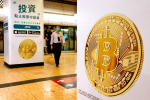Hong Kong is “back in business,” and its finance chief said yesterday that they are looking into whether or not retail investors should be able to trade crypto. He said this at the start of a week of conferences meant to improve the territory’s image.

In contrast to China, where crypto is almost completely outlawed, Hong Kong wants to loosen up rules and get some of the business that has left back.
Hong Kong’s economy has been hurt by years of strict COVID-19 pandemic controls and a political crackdown. This has led to a brain drain that the government now wants to stop.
Some of the best bankers in the world will be at a finance summit tomorrow, which starts today with a fintech conference.
Paul Chan, the Financial Secretary of Hong Kong, told the people at the fintech conference, “Hong Kong is open and welcoming to the global community of innovators who are doing business with virtual assets.”
“In a lot of ways, we are telling the world that we are back in business,” he said in a speech that had to be given from a distance because he got COVID-19 last week while he was traveling abroad.
In a new policy statement, the government said it would start a consultation to figure out how to “give the retail segment a suitable level of access.”
It also said that Hong Kong was willing to look at “property rights for tokenized assets and the legality of smart contracts.”
Hong Kong only lets people with portfolios worth at least HK$8 million (US$1 million) exchange money.
If retail investors were allowed to invest, a lot more regular residents would be able to invest in cryptocurrencies and other virtual assets, but that comes with its own risks.
After wild price swings and a string of high-profile collapses, there has been a push around the world to regulate the crypto market and protect investors.
Critics say that cryptocurrency is a great way to create investment bubbles, hide illegal money, and make scams possible. China used to be one of the biggest places to buy and sell crypto, but they stopped doing that last year.
Singapore recently tightened rules on retail transactions after a number of crypto exchanges, including one in the city-state, went bankrupt. At the same time, Japan recently loosened some of its stricter rules on listing tokens. Hong Kong was once a hub for crypto because it was a way for China to connect to international markets.
The territory then made it possible for big exchanges to get licenses on their own in 2018, but only BC Technology Group Co () and HashKey Group were given permission.
Last year, one of Hong Kong’s biggest exchanges, FTX Trading, moved to the Bahamas.

